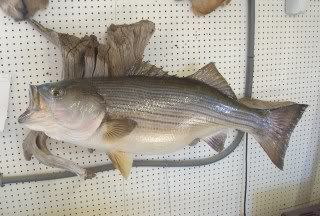Blogs
Our community blogs
-

- 3
entries - 0
comments - 8081
views
Recent Entries
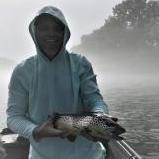 Latest Entry
Latest Entry
My Life
I grew up in North West NJ, Sussex County. I'm an Appalachian Mtn. Born and Raised Country boy. I'm not from Joisey

Proud son of the Skylands region of NJ , near the border of NY, NJ and Pennsylvania in the Kittatinny Mountains.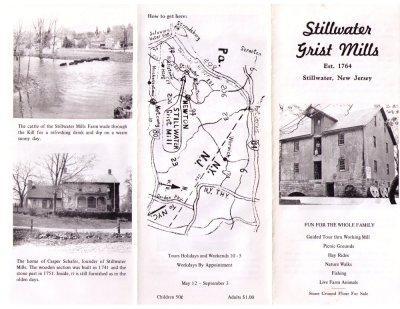
My family has history as some of the first inhabitants of the Milbrook Village in the Delaware Water Gap. A pretty popular tourist location with one room schoolhouse, black smith shop and all the trappings of the old world. http://www.njskylands.com/hsmillbrookvillageMy Nanna, Pop-Pop and family were some of the initial inhabitants of what is now National Park...Part of the Tocks Island Project. The Gov. gave life rights to land owners and the plan was to flood the region for a giant reservoir.... Thankfully this beautiful land never was flooded but we lost family legacy and land. I will take you through this journey of my life and family as I have time and reflect on the things that made me who I am as an outdoorsman and naturalist. My hope is this will give some insight into who I am and what I stand for and the foundation of my youth and the cornerstone of my psyche. In short I have a love of the outdoors instilled by my Grandfather and Father. It's a journey I hope you will take with me as I relive the escapades and moments that are at time cringeworthy, funny and worthy of personal growth and the love of all things in the Natural world. Check back as I up date and record my life.
Pop-Pop (Joseph Lowick..."Joe")
It's the mid 1970's - Dog days of summer have passed. Damp fall weather is setting in on the Ridge "Kittatinny Mtn Range in Sussex County NJ".
Been raining a couple days now.... but Pop-Pop said on his weekly visit to say hi (watch the fights on the Cable TV)........ "You come help in the garden and help me get prepped for the Indian corn" I got a surprise for ya. Then he unceremoniously spat in his hills bros. coffee can. A process repeated all day every day as evident by the stain on his white short whiskered chin.Surprises always meant Eel fishing the Delaware River with a drop line. It also meant a stop at the store to pick up pickled pigs feet, more RedMan for Pop-Pop, and Yoo-Hoo for me.
If we were lucky and got an early enough start, we got to bring the pitchforks and hunt for baby Lamprey Eel. (Pop-Pop would scoop the pitchfork into a brush/twig pile known to house and protect the young Lamprey Eel from fish and other predators and scoop it out onto the embankment where the fun ensued) Lamprey Hunt = A fast reflex game great for kids catching the squiggling young lamprey before it can get back in to the creek. We hunted the feeder creeks for about an hour looking for Lamprey nests as we called them (not allowed any more). If we got skunked we reverted to use the garden worms we dug up before leaving to head over the mountain.
I can only remember doing this twice growing up because it was a rare occasion.. Other times we'd just pick Indian artifacts along the Delaware in the plowed up fields being made ready for winter wheatAnyway - Pop-Pop didn't disappoint. We got to go Eel fishing but the real surprise would come later.......My first time working the Eel Weir. Pop-Pops commercial Eel Harvesting Operation.
The Weir
Hawkeye and Pierce just had a back and forth that caused a belly laugh with Dad and I to close out the night's episode of MASH when I heard the front door creek open to Pop-Pop saying his customary entry....No-Bah-Dee Home!
He appeared out of the dark entry into the glow of the TV light spilling from the living room into the dark foyer. "YOU READY????" Now,.... I wasn't sure what ready meant...I had been Eel fishing that Saturday and ABC's Wide World Of Sports wasn't for another couple days. So it wasn't "Ready" for Boxing and Howard Cosell and the fights we loved to watch.. Always got a kick out of hearing Pop-Pops commentary on the fights... even more so then Howard's...which is saying a lot. He said get your play coat.....I obliged...I didn't ask Mom or Dad...apparently didn't have too....it was a given this was ok...I guess cause they never said... school night or you'll catch a death of cold or none of that silly stuff.
Off we went....Just down the road from the house at the bottom of the hill was the Paulinskill and the town Gristmill
.thumb.jpg.9ce959437739aa4fc3fbcbc1a1babec1.jpg)
that just so happened to have the most fabulous Eel Weir I have ever seen or come to know... I've seen Many.- Read more...
-
- 0 comments
- 3
-

- 33
entries - 2
comments - 53080
views
Recent Entries
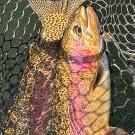 Latest Entry
Latest Entry
My wife, Marsha
Epilogue: The Wife of Noble Character
10 [b]A wife of noble character who can find?
She is worth far more than rubies.
11 Her husband has full confidence in her
and lacks nothing of value.
12 She brings him good, not harm,
all the days of her life.
13 She selects wool and flax
and works with eager hands.
14 She is like the merchant ships,
bringing her food from afar.
15 She gets up while it is still night;
she provides food for her family
and portions for her female servants.
16 She considers a field and buys it;
out of her earnings she plants a vineyard.
17 She sets about her work vigorously;
her arms are strong for her tasks.
18 She sees that her trading is profitable,
and her lamp does not go out at night.
19 In her hand she holds the distaff
and grasps the spindle with her fingers.
20 She opens her arms to the poor
and extends her hands to the needy.
21 When it snows, she has no fear for her household;
for all of them are clothed in scarlet.
22 She makes coverings for her bed;
she is clothed in fine linen and purple.
23 Her husband is respected at the city gate,
where he takes his seat among the elders of the land.
24 She makes linen garments and sells them,
and supplies the merchants with sashes.
25 She is clothed with strength and dignity;
she can laugh at the days to come.
26 She speaks with wisdom,
and faithful instruction is on her tongue.
27 She watches over the affairs of her household
and does not eat the bread of idleness.
28 Her children arise and call her blessed;
her husband also, and he praises her:
29 “Many women do noble things,
but you surpass them all.”
30 Charm is deceptive, and beauty is fleeting;
but a woman who fears the Lord is to be praised.
31 Honor her for all that her hands have done,
and let her works bring her praise at the city gate.Proverbs 31:10-
- Read more...
-
- 0 comments
- 33
-

- 20
entries - 0
comments - 11074
views
Recent Entries
 Latest Entry
Latest Entry
Kids, family and fishing
Did you take your kids fishing this year? My kids are all grown up with kids of their own now. And I think grandkids are the most fun because of course I can spoil them and send them back home. Really though, I absolutely love my kids and my grandkids, so much so that I take them fishing about as often as I can.
This all started back when I was a kid and like many of you we went fishing with one or both of our parents or maybe a grandparent or other family member or even a friend. It doesn’t matter who we went with it just matters that we got to go fishing.
I can still remember what I believe was my first fishing experience. It was at a little body of water in Oklahoma called Hula Lake. My mom and dad took us kids to the lake and while I don’t remember my brothers being there with me I do know they were there, and since they were older they were probably off fishing on their own. Anyway I was seated on the concrete dam dropping a worm and cork in the corner of two concrete walls. I pulled up fish after fish and I remember laughing out loud each time and the fact that I couldn’t wait to get my rig back in the water.
There was a man there who, as my dad explained was going to set a trot line that day and he wanted all the perch I could catch for him. I was more than happy to oblige him, of course and never even gave a thought to his taking my fish. I remember knowing what a trot line was or at least knowing he was going to catch big fish with my little fish.
I guess one of the advantages of growing up in a family of hunters and fishermen is that one receives an education in such things without knowing it. I suppose I learned most of the basics about life just listening to my folks talk with other people about what was going on in their lives.
My dad owned a second hand furniture store in Bartlesville, Oklahoma called the Idle Article. I used to spend days there before I was old enough to go to school and during summer break when I was older. I always tried out the bicycles as soon as they hit the store and he took me with him sometimes to pick up a load of furniture he had bought.
I don’t know how long he owned it but I do remember when a new street project was planned he sold out and went into business with his brother making horse trailers in Dewey, Oklahoma. Now that shop was a dangerous place for a little kid, what with all the cutting, grinding and moving machinery. I did get to go with him sometimes but it was usually on Saturday when only a few people were there.
I remember my mom driving me by the old store on the new street, which was actually a much wider by-pass sort of thing and seeing the outside of the building and a concrete retaining wall just six or so feet from the front wall of the building. The parking lot in front was gone and without having it explained to me I knew just why dad didn’t have a business there anymore.
That’s progress though and I’m sure it created more opportunities than it erased. That word progress is sure used a lot. We use it to describe the good things that go on and we use to define the failures of government also. Personally I like to use the word “progress” to describe my fishing prowess.
I started out fishing by myself in a pond behind our house with my best friend Tony Parker. Please understand the words “by myself” mean without my dad or mom or brothers you know, the people who told us we couldn’t jump in the pond or off the back of the dam into the creek. This little pond was a perfect spot for a couple of kids to explore. We sought out bullfrogs and bass along with all the trotline bait we could catch although, we never baited a trotline. I also saw the absolute biggest snapping turtle I had ever seen. Thinking back now it was probably only sixteen or so inches across but that was one third of my height back then.
When we got a little older, like maybe ten we began fishing the creek that ran by the park a little farther from the house. I later learned that creek was the Caney River or maybe the Little Caney. I still don’t know which but I’ll bet I could look it up on Google Maps real quick and find out… now that’s progress.
My folks took us fishing in a number of places. I remember we camped for a week or so at Beaver Lake in Arkansas the year it opened for fishing. We were there with my Uncle Donnie and Aunt Joyce and my Grandpa “Pappy” and Grandma “Pansy”. This is the only memory I have of grandma Pansy as, sadly she died later that year.
I believe we caught all the Sand bass out of Beaver lake year that trip and I’m sure my mom got tired of cold hot dogs in her sleeping bag but she didn’t complain. That was the year my dad tried to explain to me what blacktop was. Let’s see now, was it the whole road or just the black stripes we actually drove on that made up the blacktop. One can probably figure out the questions I had and the exasperation my dad must have felt as he patiently told me again what it was.
I’m all grown up now with kids of my own and grandkids too, as I mentioned earlier and I can hear myself in the questions that all of them have asked over the past thirty years. Why is Deer poop so small when a Deer is so big? Why do Coyotes howl at night? Do Channel cats really talk to you when you unhook them? Will you take me fishing?
Parents probably have no idea how many questions they answer over the lifetime of raising kids but it has to be in the bazillions. I seriously doubt if all those questions were ever answered but I didn’t mind, I just asked again.
When kids ask you to take them fishing and you are tempted to put them off with being too tired or it’s too windy or cold or you’re too busy please remember that one day our kids will have memories randomly pop into their heads about their parents and what we did with them when we were little. I just hope my kids remember me taking them and not putting them off.
- Read more...
-
- 0 comments
- 20
-
 Latest Entry
Latest Entry
Is fishing an addiction?
Royal people who prefer long drive in the water prefer also fishing. Fishing is like a sport for them and them enjoying each bit of it. Spending time in water with a healthy activity make it more entertained. Technology advancement make it adventures and easy for habitual people, For example, use of fish finding devices take advance fish finding approaches.
- Read more...
-
- 0 comments
-
 Latest Entry
Latest Entry
Prerapala wiggle warts
I have about 20 prerapala wiggle warts in nice shape that I would sell by the piece or them all in one bunch. There are some mag warts and wee warts, and short warts in the pic's.
Please contact me if interested. In NW Arkansas.
- Read more...
-
- 0 comments
-

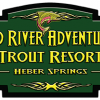 Latest Entry
Latest Entry
New Resort on the Little Red
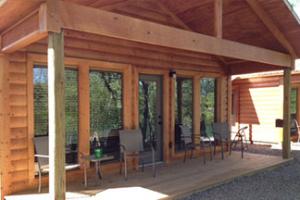 ***Now Open*** We are proud to announce the opening of Red River Adventures Trout Resort on the Little Red River in Heber Springs, Arkansas. We are located on Winkley Shoals at 100 Swinging Bridge Drive. It is only a five minute drive to beautiful Greers Ferry Lake. Enjoy watching the river roll by while sitting on the deck of one of our eleven new cabins. The cabins come fully furnished in a choice of one or two bedrooms. Red River Adventures offers cabin rentals, boat rentals, and a fishing dock. For more information, contact us at www.rratr.com or call 501-362-3327.
***Now Open*** We are proud to announce the opening of Red River Adventures Trout Resort on the Little Red River in Heber Springs, Arkansas. We are located on Winkley Shoals at 100 Swinging Bridge Drive. It is only a five minute drive to beautiful Greers Ferry Lake. Enjoy watching the river roll by while sitting on the deck of one of our eleven new cabins. The cabins come fully furnished in a choice of one or two bedrooms. Red River Adventures offers cabin rentals, boat rentals, and a fishing dock. For more information, contact us at www.rratr.com or call 501-362-3327.
- Read more...
-
- 0 comments
-

- 6
entries - 2
comments - 16530
views
Recent Entries
 Latest Entry
Latest Entry
From: Another Resort Thread -- Where Not To Stay!
Maybe the owner is an elitist fly fisherman trout guy. No disrespect to other fly fishers intended.
Champ.....I guess you get more kick out of catching a 2 lb. bass with 25 lb. test line so you can wolf it in so fast it surfs on top of the water....lol
Source:
- 6
-

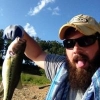 Latest Entry
Latest Entry
Looking Ahead
LOOKING AHEAD
Terribly sorry for the absence, unfortunately life has a funny way of changing things on you, but it’s time to get back to the fishing. The weather seems to have a mind of its own, and it’s obviously wearing thin on patience. If you’re starting to get the fish itch like me, then one suggestion is to get organized, and get ready mentally. If anything, it gives you a wonderful excuse to wander (somewhat) aimlessly through the aisles of your favorite tackle house.
To start the year, I like to lay out all of my stuff and organize it by type, size, application and what have you. Then I compile a list to see what is needed, and what can be added or eliminated based on my prior year of fishing. I plan, and shop and get what I think I’ll need to get going.
I also try to set a goal of learning at least one new technique each year, and that plays an important factor in my purchases at the beginning of the season as well. Goals are the driving force in becoming a better angler. Whether you’d like to pursue a career as a professional angler, or just want to catch more fish on your weekend excursion, setting a goal is harmless, easy, and can aid in making you a better person as well. Your goal can be anything. Maybe you want to win a local tournament. Perhaps you need some practice using electronics. How about your drop shot? Yes, the simple, effective, silent killer. Or maybe you’d like to learn a baitcaster, and toss a frog over some cover to see the explosion? All in all, if you accomplish your goal, that’s another trick in your bag, and one more step to becoming a well-rounded angler.
This year I plan to focus on my drop shot, and the jig. These are two things I do not have enough experience in. I’m not afraid to admit that, you’ve got to start somewhere, right? With the jig, my main obstacle will be slowing down and relying on feel and technique to get more bass. The drop shot is something I believe every angler should master, so master I shall.
I’d also like to mention the upcoming BASSMASTER University at Bass Pro Shops here in Springfield, MO. There will be FREE seminars from some legendary and great anglers including Kevin Van Dam, Rick Clunn, Jimmy Houston, Wally Marshall, Edwin Evers, Tim Horton, Gary Parsons, and Ott Defoe. There are multiple seminars scheduled, and plenty of activities for the kids. What better way to spend some time with the family, learning more about something we all love? You don’t want to miss it.
Thanks for reading, I hope to update more often. Don’t be a stranger, and happy casting.
The Bearded Tay January 30, 2015
- Read more...
-
- 0 comments
-

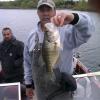 Latest Entry
Latest Entry
From: More Whites
what does a person do to make white bass edible ? I have tried to eat them and found them to taste pretty bad.. I've tried to cut the dark part off which I found to be a pain.. some people say put mustard on them and then they are tolerable. tried that too and they still take " not so good". I just through them back but I love the they fight..any help would be appreciated.. thanks
Source: wrap with bacon grill until bacon is crisp, eat bacon and throw fish away.
-

- 6
entries - 7
comments - 14687
views
Recent Entries
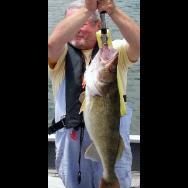 Latest Entry
Latest Entry
Wormin For Walleye - Part 1
White River Walleye on Worm Harnesses
In 1919, Norman Rockwell painted two covers for successive issues of a magazine called The Country Gentleman. The images are now in the public domain.
The Fishing Trip
The Catch
Even Norman Rockwell knew worms catch the fish.
Why many people avoid using worms and insist on artificial baits would make an excellent topic for a psycho-social doctoral thesis. I won’t be writing that. Instead, this article is intended as a primer for fishing worm harnesses in Tablerock and the other White River impoundments. What I will share comes from fellow walleye fishermen who have showed me a number of tricks. In particular, I want to thank Chuck Etheredge of Holiday Island, Arkansas. Chuck holds the Holiday Island Marina walleye record at 14.5 pounds, and he is the one who taught me about his harnesses for brush fishing crawlers.
The Bait
Nightcrawlers are one of nature’s perfect animals. They aerate the soil, they help break down leaves and other dead matter to soil, and they are so valuable to growing plants that people buy them to put in their gardens.
While brown trout guides below Bull Shoals dam say they use red worms because they are “more natural looking in the water,” the real reason is stocker rainbows that can’t and won’t leave the nightcrawlers alone.
In the last several years nightcrawlers have become a major farmed and/or harvested crop. Grocery stores, convenience stores, and even Walmarts sell them. Typically, the containers are Styrofoam or cardboard and are filled with potting soil or mulch. I buy at several locations and find the overall quality quite good. However, I always check the contents before I leave the store. Temperature or stock rotation disasters do happen.
Next important tip: As soon as you get home, place the worm boxes in the refrigerator and keep them there until the fishing trip. Crawlers will last several weeks if left alone in the bottom drawer of the refrigerator. If you are not the cook, label the boxes “worms” to avoid screams and other domestic difficulties.
On the day I intend to use the crawlers, I pack the boxes in an ice chest with ice. The ice will not freeze them in their containers and will keep them cool and lively. Once I am in the boat and ready to fish, I put some ice and lake water in a flat bottom plastic bowl and add four or five crawlers. The ice water plumps them up and washes the dirt off so your boat floor stays cleaner. In addition, you will be in and out of your cooler less often. When the ice melts, merely add another piece or two.
An alternative I recently learned was to bathe a day’s worth of crawlers at once, then place them in the now empty Styrofoam containers with ice.
In the event you wish to buy crawlers in bulk, they are available from several mail order sources, including Cabelas. Several chapters of the classic book, Lunkers Love Nightcrawlers, cover the long term care and feeding of nightcrawlers.
The Worm Harness
A worm harness is nothing more than one or more hooks combined with one or more devices to attract fish. The early Crème worm was a rubber worm on a primitive worm harness. I caught my first lunker bass on this rig.
Literally hundreds of commercial harness makers exist and a Ebay search for worm harness or crawler harness will prove it. Cabelas and Bass Pro each carry more than one brand and several varieties for each brand. The sheer number intimidates anglers seeking to try a new method. How can you know which ones work best?
For those wanting instant gratification, the “norm” consists of two small hooks, size 2, 4, or 6, snelled on 10 to 20 pound test line. Above the hooks, you will find 3 to 8 beads, and in front of that a size 3 Colorado or Indiana blade. The entire harness will run on a single three to four foot strand of line with a swivel or loop at the end opposite the hooks.
Harness Blades
Variations abound including those with single hooks; Smile, Dakota, or Willow blades; and even what appears to be a wedding band in the build.
To help understand the reason for blade choices I’ve built a chart:
Blade Type
Description
Comments
Normal Size
Smile
Easiest to spin; an offset propeller; relies on flash/ color
Clear waters
Medium and Large
Willow
Easy to spin; mostly flash
Imitates shad well
#4 and 5
Dakota
Easy to spin; resembles either a double willow or a cutout Indiana
Often painted
Medium and Large
Indiana
A cross between a willow and a Colorado
Combines thump and flash
# 3, 4, and maybe 5
Colorado
Requires more speed to spin but thumps
Great for stained or muddy water
# 3 and 4
Colors
A variety of harness colors will work. I suppose you could catch a walleye on anything if you fished long enough with a crawler attached. However, the purpose of the harness is to attract the walleye to find the worm. Certain colors and styles tend to work consistently.
As a side note, the common forage of walleyes in our chain of lakes explains the color choices. Walleye in the White River chain primarily feed on shad and bluegill. As yellow perch, common walleye forage in the North, become more prolific in Bull Shoals, the color choices for that lake may change somewhat.
Bodies with chartreuse, red, green, pink, and white are the most commonly used. I own a box of plastic beads I bought from Cabelas for tying traditional harnesses. It contains no less than 24 different shades that are variations on all of the above except white. Traditional harnesses frequently use more than one of these colors.
Common blade colors include silver, copper, and air brushed or painted blades using the color palate listed above. While I have had some success with half silver/half gold blades, harnesses with solid gold blades have never proven successful for me. Again, the yellow perch in Bull Shoals may change that.
Copper Colorado Blade/Pink Float Beads
Silver/Yellow/Red Colorado Blade/Chartreuse Float Beads
Silver Willow Blade/Firetiger Float Beads
Painted Colorado Blade/White Float Beads (Wonderbread)
How
In a previous article, Trolling for Table Rock Walleye, I wrote extensively about where and how to locate walleye. I urge you to read or re-read that article for location information.
Depth and speed are the other variables that combine with location to determine whether you have success. Fishermen successfully use harnesses for fish holding as shallow as 6 or 8 feet. The harnesses are equally successful on the Great Lakes at 45 feet behind downriggers. For the White River lakes I do not advise downriggers. Instead, those who target walleyes use three way rigs or bottom bouncers.
A three way rig utilizes a three way swivel. The main line attaches to one ring, 12 to 24 inches of line with a bell sinker at the end attaches to the second ring. The third ring holds the harness line.
Those who use this rig do so because they can quickly change the amount of weight or adjust the height off bottom. I suggest any who use this rig make sure that the strongest of the three lines is the main line to the reel. The second strongest should be the line to the harness. The weight line should be weaker than either of the others.
The alternative to a three way rig is a bottom bouncer.
The main line attaches at the junction of the “L.” The harness line attaches to the swivel at the end of the unweighted arm. As the boat moves forward the weighted arm tip brushes the bottom while the harness follows behind the weight and somewhat above it.
Bottom bouncers come in a variety of weights, ranging from ½ ounce to 4 ounces. What size to use? Traditionalists will tell you to use 1 ounce for every 10 feet of depth you will be fishing. That advice is accurate and useful under normal circumstances, especially when combined with the traditional advice on speed and how much line should be out.
If you search the internet for articles on using harnesses and bottom bouncers, almost all will tell you the ideal configuration will have the main line running from the boat to the bouncer at a 45 degrees or less. Those articles also suggest the bouncer should only “bounce” from time to time. These articles are absolutely correct, and professional walleye fishermen use these “rules of thumb” every tournament.
The last element of traditional harness fishing is the speed. Most days a speed of .8 mph to 1.4 mph will be the most effective. Be aware the type of blade can change the effective speed. A Willow spins far more easily than a Colorado. A Smile blade can spin with even less speed. You should go at least fast enough to spin the blade.
However, the ultimate decision maker on speed will be the fish. Sluggish fish may want a slow presentation. If so the weight will be less and the blade choice would be a Smile or Willow. On other days, hot water fish may need a fast speed to trigger bites. In that case a heavier weight and more line may be needed to reach the depth desired.
Chuck’s Secret Method
Careful readers may have noticed the pictures of my harnesses above are different from what they see in stores or some of the sketches I have drawn and inserted. The differences are only a part of the “secret” method Chuck Etheredge taught me two years ago. His method is an adaptation of the traditional ways; one that is designed for the highland reservoirs with submerged timber, brush, stumps, car size rocks, and house foundations.
Chuck wanted a harness that was less likely to sink when the bottom bouncer stalled because it hit a rock or limb. To that end he substituted floats for the sinking beads. If you put one of his rigs in the water and lay the bouncer on the bottom, the blade slides down to the weight, but the floats, hook, and worm stay up.
He also experimented to see if he could avoid exposed hooks. He took from the bass fishermen the idea of Texas rigging the worm. Yes, it is a soft, real nightcrawler, but the embedded hook had to help a little. In addition, one hook point instead of two equaled half as many hang points. He found a worm hook in size 1 or 1/0 was every bit as good as the traditional two small hooks in sticking fish.
Last, to keep the float beads and blade from pushing the worm down into a wad, he made another innovation. He uses a bobber stop to hold the beads in place.
In addition to changing the harness, Chuck defies conventional wisdom as to bottom bouncer weight. He intentionally uses about half the weight considered standard. At 20 feet he will use one ounce. At thirty feet he will have on a 1.5 or 2 ounce bouncer. To reach the bottom, this means he must have out considerably more line. The change in angle between the boat and the bait is exactly the reason for his unorthodoxy. He believes the “flatter” angle aids in pulling the rig up and over limbs and logs.
The combination of differences works for Chuck. On more than occasion I have watched him fish snag filled flats and timbered channel edges with his worm harnesses. Yes he will sometimes hang up, but far less often than anyone would expect. And while he is at it, he catches fish.
The first time he showed me his ways, he tried to explain his uncanny success at staying free from hangs. In my words, he does it like this. When he feels the line begin to rub over a limb, he does not jerk. He waits until the line between the limb and harness shortens. As this happens, braid line will sing or vibrate. Quite often the rod tip will feel heavier. Just when he feels the bouncer arm contact the limb, he lifts the rod in a high arc to pop the rig and harness over the limb. He then lets the bouncer fall back to the bottom. Many bites happen on that drop.
Please note that Chuck’s method requires the angler to hold the rod and feel for the key moment. This is different from those who put the harness rod in a holder.
Results
Every article about a fishing method should include a few pictures to vouch for the method and the author.
A Table Rock Limit from 2010 when Chuck showed me his secrets
Three from June of 2011
My personal best, 13.75 pounds, July 8, 2011, on one of Chuck’s style harnesses.
- 6
-
 Latest Entry
Latest Entry
Fishing Trip 4/09/12
Went out about 7:30 this morning and started by trplling for walleye for awhile. Said the heck with this and went to a favorite spot and caught 13 total. 1 was 15 " one was 14" and the rest were either 12. I did catch one that was 10" and the other one I didn't keep was about 8". All in about 2 hours. I was around the one mile long bridge. Good day.
- Read more...
-
- 0 comments
-

- 5
entries - 0
comments - 21877
views
Recent Entries
Latest Entry
My Calendar Runneth Over
My Calendar Runneth Over
By Brian Wright brian@outdoorguysradio.com
Before the beginning of each year I work on my schedule for the upcoming seasons. First, I review the past year, evaluate my body of journalistic work, and determine if I accomplished what I set out to do. This helps with planning the year at hand.
Seems as though this should be pretty easy.
Since I primarily focus on angling and/or destinations, you would think planning the year would be easy. After all, look at all the opportunities that abound for outdoor enthusiasts in our region. In addition, I co-host The Outdoor Guys weekly radio show on ESPN Radio in Kansas City (www.outdoorguysradio.com), thus giving me an additional 52 weeks of opportunity to promote the great outdoors.
But that’s exactly what makes developing a schedule so difficult.
I typically write in the neighborhood of 12 outdoor articles in a given year — not counting editorial pieces such as this column. And with the weekly radio show, I spend more than 50 hours each year on live radio in a pretty big market. Given these numbers, and the plethora of story ideas bouncing around my cranium, therin lies the problem.
A rough breakdown of the articles will include some 10-12 straight-up fishing articles (how to, or where to go type articles). Then there will be another six to eight destination articles focusing on great places to go and what to do when you get there. The radio show integrates nicely with the writing.
My favorite articles to write, and radio interviews to conduct, are human interest stories. I love to sit down with people, ask them questions, and share their story. I could easily find enough interesting people within 250 miles to write at least a dozen of these stories each year, and do so for many years without repeat. However, time, money, and space dictate that I will probably write six to eight human interest stories in a given year.
Do the math and you will begin to see the dilemma of an outdoor writer/radio host in the Midwest. I’ve already alloted enough editorial as outlined above to fill my quota for the year. And I haven’t even touched on boating, camping, turkey hunting, and black-powder guns — all of which have a high level of interest to me.
I suspect many of you have equal difficulty finding time to follow all of your favorite pursuits.
That’s exactly my point of planning.
With the proper organization and planning I’ll be able to pack an enormous amount of outdoor activities within the next 12 months.
You see, it doesn’t really matter if you are planning your outdoor activities in conjunction with your job, as I do, or just planning your outdoor activities. You must rely on your principles and goals to guide you.
Although I spend a lot of time in the outdoors, I’m just like most of you. I have family, friends, a household, and other business interests which must all be planned for as well. And the better job I do of organizing my tasks, the more effective my actions are.
In Stephen R. Covey’s exceptional book, The 7 Habits of Highly Effective People, Habit 2 is to “Begin With The End In Mind.”
I’m certain — proven through personal experience and the actions of other effective people — that Covey, and others scholars, have identified the habits of success.
For me, beginning with the end in mind is critical. To effectively organize and balance our lives, we need a plan that has a specific goal to be reached in a realistic timeframe.
I have two key phrases that I continually tell myself. First, a saying from Thomas Edison which states, “genius is 1% inspiration and 99% perspiration.” This reminds me that if I work smart, and hard, I’ll be successful. The second phrase I use to motivate myself is by the philosopher Goethe who states that “things which matter most must never be at the mercy of things that matter least.”
I have found a beautiful balance between work, family, and recreation by becoming organized and focused.
Find your own motivational statements, and grab a pencil and 2012 planner/calendar. Develop a plan which is ruled by your principles and leads you where you want to go!
- Read more...
-
- 0 comments
- 5
-
 Latest Entry
Latest Entry
Alaska, 1St Trip
I've been thinking about Alaska since being stationed in Panama some twenty years ago. Finally after realizing that I've been thru Desert Shield/Storm in a Mech Infantry Unit and a year in Afgahanistan after 9/11, and that I've turned fifty years+ old...what am I waiting for?!
Booked a flight from KC to Denver to Anchorage. Surprizing less than I thought, about $560 round trip. (Book early)Reserved a car for two weeks. (about $700) Planed on fishing (2 week license $88) and exploring the Kenia Peninsula staying at bed and breakfast inns($89-$130 a night). Staying in Cooper Landing and Homer. Packed some recomended fishing gear and way to much other stuff for the trip, and took off. (This was August 6th to 18th)
Now at first I was reluctant to go to Kenia Peninsula. I've read of the crowd of tourist standing in line and the backed up traffic. Thoughts of Branson traffic on a weekend almost changed my mind. But then I thought why does everyone want to go there? Must be a reason. To my pleasant surprise, no crowds, no traffic, great weather - except on arrival.
Arrived in Anchorage at night & raining. Slept that night in the car at the airport, no problem. I would have missed one of the most beautiful drives of my life that next morning along the Seward/Sterling highway. Stopped along the way to watch the tide coming into Cook Inlet..awesome, and the mountains...awesome.
Cooper Landing..beautiful. Stayed three days fishing on my own picking up tips from others and the tackle shops. Next time I'll take a guided day float/fish trip. Finally seen some bears with cubs on the Kenia & Russian river on the third day. Just follow proper awareness and bear saftey you'll be fine. Also figured out the "Kenia Flop" as one guide put it for salmon, and hooked a sockeye for a ten second fight before breaking off. Went to a fly rod for C&R rainbows.
Drove on down to Homer...I love Homer and want to retire there now..all tho I have not wintered over there yet. The Anchor river is a 14 mile drive back. (Along the way a Moose and two yearlings grazed along the road side.)Good for wade fishing silver salmon coming in on the tide. Hint, dont be on the other side of the river at high tide. Nuf said. Again hooked a silver for a breif fight. Took a half day charter boat for halibut ($100)and caught two, the limit. The fish was less than average size. only ten pounds of fillet. Next time take an all or multi day trip. Spent time on the "Spit" with a helpful local who was bank fishing for cod, halibut or what ever was pulled in. What a view..fishing surrounded by mountain glaciers, float planes and great weather.
I had met several people from the northern US who fly up to Alaska two or three times a year to fish a few days and take thier catch back home.Fesh salmon & seafood in the frezer. And the international visitors from Italy, Germany, Australia and Russia. But when I met a man and his son fly fishing on the Anchor river (only ones there that day)and he was from just down the road Carthage, and that he has also hunted Alaska(some thing I also want to do)for six years..WOW.
I had wanted to see Denali while there so drove all the way back to Anchorage and 100 miles north. Stayed at the Princess Crusie Lines Mnt Mckinnley Lodge. Found to my great discomfort that 'crusie line tours' is no way to see Alaska and I advise anyone to never do that. Unless doing nothing is your plan. Anyway, the employees were nice but I didn't like the 'cold corporate' fake atmospher compared to the warm personal touch and local knowledge of a B&B. I really liked Homer and besides..I'm on vacation! So drove back to Homer for four more days of fishing, beach combing and just relaxing.
I found that to me Alaska is a lot closer than I thought. (6 hours there & 4 hours back from Denver)and more affordable if you make it that way. I packed to much clothing and things I didn't use which cost over wieght baggage fees. I wasn't going on an expeditionary deployment as in my military life,its a fishing trip on vaction. Just a couple clothing changes, fleece jacket & rain gear. I also packed a few days of Mnt House freze dried meals & bought at a grocery store,dinng out is expensive. I also packed a small tent and sleep bag that - had I used at one of Seward or Homer camp grounds a night or two like many other people were, I would have saved a little more. The economy rental car was great!I could go where and when I wanted and if the weather changed..so did my plan. The highways on the Kenia have several pullouts to easliy access and fish the many rivers and lakes there.And trail heads to get into the mountain lakes.
Well, if your thinking about it, got a couple of weeks vacation to plan out, and a bit of room in your finances..go! My trip total was about three thousand on the credit card(airline,car,rooms,gas,some meals and gifts) I have the winter to pay it off. But the experience and satisfation that..'Yes! I went there and did that." will last the rest of my life. I came back with hailbut,cod and silver salmon,froze, vacum packed & boxed for the air line. But Alaska is a lot more than fish. I feel blessed that I got to fish a salmon run with black AND BROWN bears in the river. Had to slow down because of moose in the road. Reeled in a halibut from 150ft of water. Had a beer by a fire watching the moon rise over glaciers on Kachemah Bay. Meet people and the dogs of the Iditorod. And yes I'll be going back.
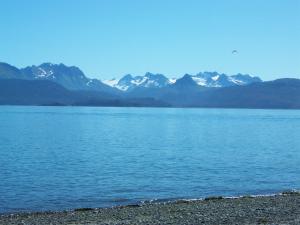
-

- 5
entries - 0
comments - 28562
views
Recent Entries
 Latest Entry
Latest Entry
My Bas University Experience
I have had a week to reflect on my Bass University experience in Shreveport, La. During that time, I have had a lot of folks ask me, "was it worth the trip". I usually start my answer the same way. It was worth it for me. Not because of any ah ha moment. If I was new to tournament angling, I am sure there would have been some. During the two days of seminars, I didn’t find a magic lure, a new presentation, or some closely held secrete technique that will catapult me to the next level of tournament fishing. But that wasn’t my purpose for attending. What occured last weekend fueled my passion. After the Shreveport trip, I am more dedicated to pursuing my dreams; but The Bass University was no Anthony Robbins “Date with Destiny” motivational seminar. So, what was it all about? Why did I decide to attend? What was my Bass University experience? I hope to answer all of these questions.
What was it all about?
Bass University has a lineage back to Bass Anglers Sportsman Society (BASS), but the latest edition comes to us from Mike Iaconelli and Pete Gluszek. They call The Bass University, the institution for advanced anglers. It was two days of seminars that consisted of twelve separate blocks focused on proven tournament angling tactics and techniques. The seminars were delivered by six of the world’s best professional bass anglers. Even if you think you already know everything you need to know about topwater, cranking, spinnerbaits, and soft plastics, the breakout sessions and “the daily weigh-in” may have held a surprise for you. The breakout sessions allowed us to go one on one with the pros, digging into their tackle box and into their years of knowledge of tournament fishing at the highest levels. The pros were frank and honest with no questions off limits. “The daily weigh in” was another special treat. No matter what was on the seminar schedule, “the daily weigh in” brought the pros back in for a discussion on the topic of the attendees choosing. So back to the question, was it worth it? The answer was simple for me. What is having any and all your bass fishing questions answered buy some of the world’s best professional anglers worth? My answer is priceless.
Why did I decide to attend?
I approach tournament bass fishing with a passion fueled by the competition with the hope of making it a future career. Just like in all life’s endeavors education is the key. Not just primary and secondary education, but I believe in the culture of lifelong learning. Even though, I have taught numerous fishing seminars over the years and have been relatively successful competing against some of the best local and regional tournament anglers. I still have the desire to learn and grow. For me, reading articles on new tackle and equipment is not enough. Spending hours on the internet doing tournament research is not enough. Learning from my peers and competitors is not enough. Spending every available minute on the water still doesn’t fulfill my desire to learn everything about the sport. For me, The Bass University was the next logical option.
What was my Bass University experience?
It was a reaffirmation, a rededication of sorts. It was two days with like minded people digging into the insights of six of the world’s best professional anglers. Did I walk away with something completely new? No. But, do I have new insights? Absolutely. The insights into details that will no doubt help me make better and faster decisions in the pursuit of becoming a better angler. I left Shreveport with a renewed confidence and a deeper conviction about my bass fishing knowledge and abilities. My experience was a reaffirmation on why the details mean so much and directly lead to success or failure on the water. I left with a rededication to the work ethic that it will take to reach my goals. Mike Iaconelli said, “No bites are accidental” and that resonated with me. The work that remains ahead is figuring out the why of each and every strike. I know that this experience hasn’t propelled my abilities to some new cosmic level. However, my Bass University experience has left me with an endless yearning to improve my abilities and a renewed dedication to achieve in the sport I love.
In closing, if you ask me do I think you should attend one of the Bass University events next year? I would say, it depends on what you want out of the experience. If you want to find some hidden secret to catch fish, don’t waste your time. If you want to become a better angler, then don’t miss the opportunity of a lifetime. But you will need to answer that question for yourself.
To read more of Larry’s Blogs go to http://larrystoafer.com/
- Read more...
-
- 0 comments
- 5
-

- 4
entries - 4
comments - 30439
views
Recent Entries
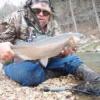 Latest Entry
Latest Entry
Collecting, Or ?
What really happens in the mind of an individual when they start fishing, and collecting, and I don't mean just fly fishing, I think this all starts
to happen really young in life, I was brought up in the junk mans way of thinking, now I don't mean this as bad, I mean this
was great for a young boy to be raised like I was, I was taken to many different arenas of life, junk stores, flea markets, auctions
just about any kind of place that had used junk, my parents were always going to places like this and so I was taken along for the ride.
I learned so much and didn't even know I was learning things that would change my life when I was older, I got to where I could talk to just
about anybody, wasn't to bashful, you couldn't be when you were trying to barter on a fishing reel or fishing pole, if you could just get the
person to take a 1$ for the reel instead of 1.50 $ then I could save that .50 for something better down the road. Now my dad can talk people
down on the price of an item, but my mom is 100 times better than him, and that is saying a lot.
But I remember buying a stack of old outdoor magazines when I was about 11 and thinking I had hit the jackpot, the reading in those old
magazines was like going off into a new world every time I would read about the cape buffalo hunting, the fishing in far away places, at that
time places like colorado, wyoming and other western states were nothing but dreams for me.
I read and reread those old mags and still have them to this day, I will never part with them, like an old good feeling pair of jeans, I won't
get rid of them, someday I'll be reading one of those old mags and it will just go up in a poof of dust and be one with the universe again, but
until then I'll keep reading.
When I was just a young man I owned several rod s and reels, mostly old zebcos, and old fiberglass rods, but they were my prized possesions at
the time, I cared for them like I do my high dollar rods today.
As I got older, I was working more and had a bit more money, I remember mowing yards all one summer so I could afford to buy this 4 1/2 foot
HMG Fenwick spinning rod, I had looked at this rod for over a year, and I still remember the day I got that rod, and I went to Roaring River the next day
and caught so many trout on that little spinning rod, that may have been one of the turning points in my young life, because, I think from that day
forward, I lived to buy the nicest rods I could afford, and then came fly fishing.
I remember my first fly rod, it was an old eagle claw, bright yellow and all of 6' feet long, I guess here is where my obsessions with small rods started.
I can remember going into the fly shop at the bottom of the Roaring River hill(now where the Devils Kitchen trail starts) and with my 5$ I could get 4
wooly worms, and leader or tippet, a soda and still have a few dollars left over, the owner of the shop, Gary Box was a big help, he always
seemed to be willing to help and I was willing to listen and learn.
I enjoyed fishing the park, it was where I could go and spend the day, when I was all of 12 years of age, you could spend the whole day at the park
and fish and enjoy and you were wore out from fishing when your parents came down to pick you up after the got off work.
I don't really remember catching that many trout, I know from time to time I would catch a mess and we would cook them when I got home, but
even then I didn't really like eating them or cleaning them, so I was catching and releasing most of the time.
Well from that old eagle claw fly rod, I graduated to a 7' Fenglass fly rod, and I was ruined, that rod was really nice and light, I belive it was a 5wt
but it was so much lighter than my eagle claw, and I do remember that rod fondly, I lost that rod in a fire in the upstairs of the lodge at Roaring River, but
I have since replaced it with a like rod.
Everyday I look at forums, auctions, vintage tackle sites, I'm not sure why I do this, I started out collecting old lures and stuff when younger and then
while working for Mr. Nickols at Roaring river for 13 years, I acquired many, many, many fly rods and reels, I got into collecting the Ari-T-Hart reels for
awhile, until I had over 40 of them, I have since whittled that # back down to only 15 ATH reels, I had to sell some of them to buy other reels.
I have since those early days at Roaring River acquired many many rods and reels and other fly fishing paraphernalia, I have lots of neat nets, boxes,
chest fly boxes, old bamboo has just about ruined me, I have bought so much bamboo in the past few years, I think I may have a little problem, I
figure I have about a rod a month habit right now, sometimes it is a rod a week, since I started collecting old vintage glass rods, as I'm sitting here
typing this my phone dings and another auction ends and I have yet another nice rod to add to the pile, and old Herter's 5pc glass rod, made by
Phillipson, I'll fish it a few times and set it with its brothers in one of the safes I have purchased just to keep the rods in, not worried about them
being stolen and many are worth very little, more worried about fire, and my dogs chewing on them.
I would like to know if this habit get better with age or gets worse, I guess if I live long enough I'll find out, but for now I just keep on buying and trying
to buy rods and reels of my youth, I'll buy a rod now just because I wanted it when I was young and couldn't afford it and now, it is still kind of expensive,
but I keep telling myself that I really should buy it and see what I missed out on when I was young.
I am writing this because I was going to sell a few rods to make way for a few bamboos I have on order, or that I may acquire in the next few months,
as I sat and counted rods, after I got up to 160 I quit counting because out of the 160, I could only find one or two that I really wanted to sell, and that
really isn't worth the bother to just sell two rods, so I packed them all back in the safes and closed the doors and started looking on line to see if I could
find a deal on another safe, after all it might be easier to just buy one more safe than try to start selling off my rods.
Tim's Fly Shop
Tim Homesley
- Read more...
-
- 0 comments
- 4
-

-

- 8
entries - 2
comments - 27272
views
Recent Entries
 Latest Entry
Latest Entry
Week One . . . The Only One That Counted
If you don't like to fly, don't even think about taking a trip like this one. All together we took 12 flights, including the bush plane ride from Kotzebue to the Kelly River. By the time we landed on the gravel bar next to the river, we were ready to be out of the air – despite the incredible scenery. It was two hours to Denver, six hours to Anchorage (overnight), more than two hours to Nome, 45 minutes on to Kotzebue and an hour in a 206 to the headwaters of the Kelly. It was a long haul. We did upgrade on the long flight and got good seats, with extra seats beside us –a big plus. If you ever fly to Anchorage, spend the extra bucks and get a seat with extra room - it's worth it.
We needed to pick up our satellite phone in Anchorage before heading to the airport. We asked the hotel desk clerk about the shuttle, but she said by the address she knew a cab would only cost $10. Naive tourists we were! We called a cab and headed out to -- the other side of town! We sat in the back of the cab and watched that ticker click off $2.50 every minute or so and thought, "How much is this sat phone going to cost us?" Little did we know. As we got closer to the address, the cab driver was confused. So we drove around the block, and then again. I said, "Let me go in this building and ask." I found out it was down the street, so I ran over and went in. Of course, the phone wasn’t ready, plus it wasn’t the right phone, so I spent over 20 minutes on what was supposed to be a quick turn-around. Heading back to the street, I saw Bill sitting on the curb with all our stuff piled up behind him. I should have taken a picture! “Our epic float trip in remote Alaska starts here!” The same cabbie came back by, picked us up and took us back across town tot the airport. Bill may have to correct me, but I think the cab ride cost us $100, about what the sat phone cost us for the week.
With no other issues, we made it to the airport and boarded for Kotzebeu. Neither of us had been to Nome or Kotzebue, Alaska, so it was exciting to visit both cities. We were disappointed, though, that we weren’t getting off the plane at Nome on our stop. But the quick stop there carried us to our final destination quicker.
Seeing Kotzebue from the air was surreal. It’s completely on a knob stuck out in the bay with water on almost all sides. The runway was even built up out of the water like a bridge to the mainland. As we got out bags, Bill went outside in the parking lot to see if he could locate our air service company. He asked an Alaska State Trooper for directions and the young man promptly said, “Get in and I’ll take you.” Pretty cool welcome, I’d say! It was just around the corner so personnel were soon back with a small truck to haul us and our stuff to the hanger.
After visiting with Jim Kincaid, the owner of NW Aviation, we found the supplies we had mailed up ahead --all there and in one piece. We unpacked it all and organized it into waterproof containers. Then we ran to the store and bought some fresh groceries plus our fishing and hunting licenses. When we returned and weighed it all, plus ourselves, we found out we were 100 pounds over the plane’s limit. We had suspected as much, but Bill thought Jim would be forgiving - nope. I don't blame him. We pulled out what we thought we couldn't live without and he blessed our load.
Looking at the plane, I thought how are we going to get all this and our bodies stuffed in it! The pilot said it would go and it did. It was cloudy, a little breezy and it felt like about 60 degrees -- just what we expected. We were ready to go.
The flight was beautiful. We crossed several rivers before the Kelly. Our river looked nice and big at first, but as we flew further and further upstream, it got smaller and smaller. The water was very clear, and we thought for sure that if there were salmon or char we should see them. We saw no signs of fish. About half way up I was beginning to get concerned about our chances to float, let alone catch fish. I could envision us dragging the boat through riffle after riffle for miles! I didn't realize it, but Bill was thinking the same thing.
The pilot circled the landing "strip" to check the wind and then landed -- very smoothly despite rolling over sticks, brush and rocks. Pretty cool -- we were there! Once we got off, the awesomeness of this special part of Creation -- the quiet, the breeze, the water, mountains and tundra – hit me. Who cared about fish? It was already an amazing trip.
I kept peeking around for bears as we unloaded the plane. Even while blowing up the raft, I kept up the “guide wariness.” Little did I know we wouldn't see an animal on the entire float. I ran down the "runway" to film the plane lift off. Again, I was amazed how easily he took off from the gravel bar. After he was in the air, I thought, "It's just us!"
Our plan was to float down a ways and find a good place to camp. We had no idea what was ahead of us as far as places where fish were holding. We shoved off and floated about a mile, found a nice, sandy spot and set up camp. It was about 6 p.m. when we landed. I knew sundown was around 8:30 p.m., but I also knew that it takes another hour after sundown to start getting dark that far north, so we had plenty of time to get settled.
The next morning we awoke to frost on the tent. Just a couple of days before, we were enduring triple-digit heat at home in the Ozarks. Now frost! I much prefer frost myself. We broke camp, loaded the raft and headed out for holes that were home to big char.
We floated for I’d say three hours through some beautiful country. Vast – that would be a good word for what we were seeing. The mountains lining both sides of the valley we were in looked almost fake—a painting may be. The river in front of us at times gave us choices to make, dividing into braids, taking off in lots of different directions. We said on more than one occasion that it would have been nice if the river had stayed in one stream, providing us with plenty of water to float and may be hold a fish or two. But that’s not the makeup of most rivers in Alaska. The valleys are wide and flat. In the spring and early summer, I’m sure they’re full of water from snowmelt. By the looks of the floor of the Kelly River Valley, the braids have different pathways each year through the valley. I’d love to see the area with the water high.
In fast, deeper sections, I’d see a fish or two darting from in front of the raft, but it was hard to identify what kind of fish. I thought, at the time, they were chum salmon because I caught a glimpse of white. When salmon start their dying stage, their flesh will die off and turn white. That’s what I thought I was seeing, but knowing now what we saw later in the float, these fish were actually char -- so we missed at least a few chances to stop and fish for them early in the float. But the numbers of these fish weren’t close to the big numbers we’d find just a little farther down the river.
We were looking for a river coming in from the east, one that Jim called “No Name River.” Not sure if that was its name or if the river actually had no name. Odd, seeing there aren’t many rivers up there flowing into the Kelly. We failed to turn on our GPS for the first few miles of our day’s trip, so we were guessing at the distance, fearing that we had missed it somehow. But we noticed a wide valley coming up to the east, and then we saw a small stream entering our river. That was it. Bill rowed the raft up in an eddy close to the inflow, and we saw our first male char, a sight that about made both of us fall overboard.
There was a perfect place on the shore to camp, so we beached the boat and started to scope out this section of river. We still suspected we’d see chum salmon close by and thought our beads would be the right tool to catch these trophies. But we were wrong. No salmon. So we went to Plan B — big streamers.
Bill was the first to hookup. He was fishing the plume where the No Name, or what we now call “Maggie Creek” flowed in. After a long fight, he landed what was the first of many male, sea run arctic char in that stretch and the largest of the char we’d catch on the trip.
We tore ourselves away from fishing to set up camp. But then it was back to the river and more hookups. Bill figured out the best way to present our streamers. He’d lay out a long cast across the river and immediately started mending his line upstream over and over. Each time, he’d bump the fly while still letting it drift downstream. These were heavily weighted flies, either with lead eyes or lead wire, so they were getting close to the bottom, which was about four feet down. But the water was swift and the drift was short, or the heavy flies were perfect for this style of drift. You knew when you’d get a strike—they didn’t mess around.
We both landed male char pushing 38 inches in length, but more impressive than the massive bodies was the color they presented. A master painter could not create a more beautiful fish than these, and we were so grateful that God created them for us to enjoy.
We decided to camp for three nights at Maggie Creek. We explored the river up and down from the mouth but saw no other fish. We did, for the first evening and next day, see more char making their way up the shallow riffle below this hole, but after the first day we didn’t see another fish come up. Were some of these fish heading further upstream or staying here to spawn?
I did hike over and up onto a ridge overlooking the valley. I was tempted to walk on up at least to the base of the mountain range, but Bill wasn’t up to it, and I didn’t want to meet a bear out in the open tundra by myself, so I sat and took in the view -- and picked a few wild blue berries to add to our pancakes the next morning.
The third morning, the fish seemed to be tired of our company. They weren’t hungry. We had already decided it was time to get on down to Wrench Creek, the second and final creek that Jim had told us entered Kelly River, again from the east. So we broke camp, loaded up and headed downstream.
The river kept breaking up in multiple braids, and at times it was hard to tell which were the right ones to pick. We were doing pretty well when we decided to take a path that lead us to shallow water and lots of dragging. We could see the main stream to our left just a hundred yards away but couldn’t get to it. Finally, we pulled our way through tiny streams of water to the big water and vowed not to do that again!
We stopped at several interesting spots. One was a huge bluff and deep holes. The water was a emerald green color in one spot and a sky blue in another. We did see a couple of male char holding in one deep pocket but they were way too spooky to entice with a big leech. We ran into several large wooded areas with tall pines. Upon further exploration, I found the floor of these wooded patches to be tundra, which I thought was strange. But Alaska is full of wondrous surprises.
Finally we found the mouth of Wrench Creek. It was much larger than Maggie Creek, much more like a creek you’d find here in Missouri. I’d almost switch the names around and call Wrench a river and Maggie a creek but I’ll leave it alone. Wrench had wooded areas on both sides of the creek as well as up and down one side of the Kelly River. Pines and willows, and the willows were in full fall colors – bright yellow. The tundra was also sporting its fall foliage in shades of red and burnt red. I couldn’t stop taking pictures. If only the sun would peak out, I thought, it would be totally eye-popping.
We pulled up on the bank across from the mouth of Wrench Creek, knowing we could wade across the Kelly to access Wrench when we wanted to. The gravel was small enough for our campsite and tent to be staked it out and set up camp.
Fish were jumping in front of camp on the Kelly on the opposite side of the river in deeper water, and we did try fishing that stretch, but the current and depth of the water were not right. We fished and caught out fish up in Wrench and that’s all, just in the creek. Because we only found fish at Maggie and now at Wrench, where water flowed into the river, we decided instead of floating on down to the mouth of the Kelly, we’d stay here and finish out our week. We called Jim at NW Aviation, and he said that would be fine. Why leave fish and take a chance on not finding any downstream?
Not every bend had fish up in the Wrench, but the mouth and first bend did. We did have to walk about a fourth mile up around three bends before finding more char and grayling. They were holding mainly along deep-cut banks. We found four good areas with fish. The river split in two parts above the last hot spot. Exploring up another half-mile, we thought it didn’t come back together, but when we flew out, we could see from the air that it did, meaning we probably should have walked up farther.
It did seem there were new char in the creek each day, so we weren’t fishing for the same, exact char each day. But I know we caught some of the fish twice over the three days we were there.
There were still a good number of chum salmon in the river and dead ones along its bank. But for the most part, they were done spawning. Fortunately for us, though, the char and grayling were still interested in anything that looked like an egg floating down through the chutes. Our chuck-n-duck method served us well, pegging a 8mm bead about two inches from a #8 hook. We also did well tying on a black leech or wooly bugger and pegging the bead two inches above the fly.
The bigger char were found at Maggie River for sure. We did land quite a few males well over 30 inches at Wrench but nothing close to the 36- and 38-inchers we caught at Maggie. Those were big brutes. Also, I did see one male char at the mouth of Wrench that would have measured well over 40 inches, but he wasn’t interested in anything we offered.
Bill did a great job bringing everything we could possibly needed on the trip, including a great sleeping mats, bags and an efficient Cabela’s tent, cookware and good eats and every tool needed to keep us alive in the “bush.” It sure pays to be prepared!
The last morning, we woke to dense fog, the only day that we couldn’t see the mountain to our west. We had already packed up our fishing gear and most of our equipment the evening before, thinking it might rain that night. We didn’t want to ship back wet stuff! Having nothing to do, we lay in our tent and read, snoozed and waited for the skies to clear. With obviously not internet to check the weather, we had no idea how long it would be – an hour – a few hours – a day or even two!!!??? Pretty helpless feeling actually! But about 10 a.m., I peaked out of the tent’s door, and I could see the mountains! We called Jim on our sat phone. It was clear in Kotzebue, and he estimated he’d be there in about 45 minutes.
Would I do that again? Float a remote river in Alaska? You bet! I’ve been going to Alaska for six straight years and this trip by far was one of the best. I’m already thinking about next summer.
- Read more...
-
- 0 comments
- 8
-

 Latest Entry
Latest Entry
Here I Go Again.....
I truly love this site! Really! My wife is a facebook fanatic and along with about everyone else in my little world has been trying to get me to sign up for that crazy stuff just about everyday. The more I think about it though, I really don't have anything to share that any of those folks really give a hoot about! I'd just as soon sit here tonight in Stillwater, OK and write this theraputic blog about finding out just how much I love bass fishing again. I'm an addict again..... For a while when I lived in SE Oklahoma, I lived on a pond bank. Everyday after school I'd gather up my stuff and find the nearest hole of water and fish it till there wasn't a still spot of water left on it! Then.... I got married and moved back to NE Oklahoma and went a while without even thinking about picking up a rod and reel(unless it was in Cassville, MO). Just by accident one day, I was standing at my brothers house and asked him if he had an extra pole I could borrow for a while just in case I wanted to go. 6 rods later, and enough tackle to fish the BASS tour, I found myself trying to find ways out of work, and on some water fishing. Since then, I have fished at least 4 times a week, and my wife, who is due with our first child in November, is just about ready to whip my brother for giving me those rods! Anywho, it just seems amazing to me how much I missed being ANYWHERE fishing. If I had my choice, I'd certainly be at Roaring River, but between trips, I'll fish anywhere I can.
- Read more...
-
- 0 comments
-

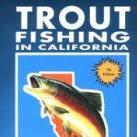 Latest Entry
Latest Entry
Stockton Lake Walleye
Here goes. I have fished Stockton Lake for many years. Just love this lake for its beautiful water and lack of traffic. I can get to the lake in under 30 minutes from my house. Walleye. I know they are there. I can feel there presence. I do catch a few, randomly. I want to catch them on a more consistent basis. Like most, I can catch more in the spring while crappie fishing. However, when the waters warm, and I assume them move deeper (over 20 feet) it ends for me. I can jig crawlers for hours off points, near bluffs, flats, constantly fighting wind and waves to keep my boat where I think I should. Nothing. Ever. A catfish here and there, perch nibbling like crazy, even the occasional smallmouth. Don't get me wrong, these fish are just fine. But they are NOT walleye. Trolling? Oh yea. Then I catch Drum. Lots of Drum. Sometimes BIG drum, but the are NOT walleye. I have fished canada and caught hundreds, maybe thousands of walleye. So I do have a clue, just not on Stockton. All this said, I do enjoy my time on the lake slowly drifting and thinking of the day when a walleye actually bites. Way back in 2005 I actually caught 5 walleye in one day. Fluke. I havent caught one since. Do the math, that's 5 years. I don't get out all that often, but still, 5 years is one long dry spell. Now I am not asking for anyones "honey hole", but throw me a bone. Above 215 Bridge or below? Point B2? B6? Thanks for your time, and good fishing.
-DBo-
-

-

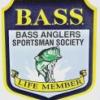 Latest Entry
Latest Entry
My Photo Gallery.......
- Read more...
-
- 0 comments
-

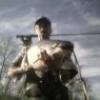 Latest Entry
Latest Entry
1/25/10 Busch Wildlife Trout
After a long cold snap, then a week or more of a warm spell, things are going to cool off once again. The last 5 or 6 trips ive taken over the last two weeks have resulted in no fish and no bites. Clearly time for a change. after noticing some posts about busch wildlife, i decided id give it a try. Number one, its close. Number two, no kayaking involved, three, Ice free water for the last couple days, 4, the trout out at bush might be hungry in light of the fact its going to get might chilly again. In all honesty, one day is probably as good as another, I actually wouldn't know because the last time i fished trout there was like 10 years ago, one time!
The wind was blowing feirce...up to 30mph and the temp was below freezing causing my guides to build up a layer of line grabing crust. I started with an 8wt shooting head i just rigged up last night until one of my connectin loops pulled free and i almost lost my sinking head. I headed back to the car to get another rod. I decided to go witht the 7'9" 3wt. I made it back around the lake just as some other fishermen were ariving. I started to fish, and to my surprise, It seemed like there were plenty of fish biting. The action wasn't scorching but it was consistant. 8-15 casts per fish. I will take that any day! The fish were all what id expect of them. around 13-14 inches mostly. As i fished i had a yellow estez egg fly bust off on the strike. My hooks were old and a bit rusted. so i took my tippet up from the 6x to the 5x section and tied on a little beadhead estez bugger . Of everything I used this little guy seemed to be the best. I just cast to the wind side of the little jetty and almost let it dead drit toward me, but I did stip some action to the fly. On one such cast, i detected a strike and set the hook. tug. flash. "Holy Shoot, what is that, Is that a carp? that cant be a rainbow! wtf is that!" about this time im realizing one way or the other Carp or Trout ive got a big fish, and oh yeah is that my line around my leg? shoot! acrobatics to get my leg out...Ive got my leg out..now the fish is making burst and my drags too loose! oh shoot, im gunna lose em! I make some feeble attemts to reach around to the drag knob with my line hand but all i can do is loosen it further. Ok, swithch hands tighten drag. now, wheres the fish? oh no! am i snagged. i tug and tug and motion! ive gotem still, hes not snagged up. he makes a couple good runs, screeming out line. ive almost got em licked, if i can just beach im" and slowly I do." holy cow!!!! masive!" i bend over and lip him like a big ol bass and lay him on some grass. i secretly hope my fellow anglers at the lake are aware of my predicament. after all, shouldnt the dancing and running around and screeming drag have gotten their attention? oK focus....how big is e? ok . i hold him up to my rod mouth open tail flaired and hes 1/2 inch shy of my fisrt guide. that guide is 24 inches from the but. almost certainly 24 on a measuring board, good enough for me to claim 24 I think?. i lift the fish by its mouth and put my other hand under its belly so the guy across the way can get a good look. he's not paying any attention! ... and then quikly resusitate and release. Im not sure anyone whitnessed it and i left the camera in the car. too cold to take pictures i guess. ? i need to start keeping a camera on me at all times. helmet cam or somesuch. long story short, Im going back first chance i get. good times.
- Read more...
-
- 0 comments
-

- 22
entries - 2
comments - 34124
views
Recent Entries
Latest Entry
Boundary Waters Last June
I didnt talk alot about our B DUB trip last june. We floated the Granite River to Saganaga Lake. This was a short 3 dayer because it was last minute and didnt have alot of time. The smallmouth bite was late due to a late spring. We started slow but after we got the hang of it after day 1 we probably averaged 10 or 12 each per day. The biggest was 18 with the average around 14 to 15 inchs.We caught some northern but could not score on walleye. Most were on the drop off edges about 10 feet off the bank.
Weather was good and the bugs were not terrible. Couldnt really fish at night because the mosquitos were to much to handle.
- Read more...
-
- 0 comments
- 22
-

- 4
entries - 0
comments - 31018
views
Recent Entries
Latest Entry
Passing
Yesterday was the winter solstice the shortest day of the year and after the day passed we started our slow tilt back towards the sun and now everyday should be longer than the previous and I already can feel the warm sun of spring fast approaching. I do realize that we have the toughest months of winter to endure before the temperature and subsequently my spirits rise. But I always mark the winter solstice every year as a day of celebration for the beginning of a new period. It honestly holds more significance to me than the new year does. So to celebrate this day I did not drink or eat myself into a dazed stupor or make promises to myself that I no I wouldn't be able to keep, I instead went fishing. As bad as it may sound I never enjoy celebrating life in the company of others, I only find the things that make life worth the effort in complete isolation in an environment that has been changed very little by the hands of progress. This makes me an outsider a so called weirdo to everyone I know. For it is very natural for Homo sapiens to be absorbed in the lives of those around them and to come across an individual who is not is very unnatural. But how I feel about it is what matters, and honestly I'm OK with it. I can live through anything anyone feels or says about me as long as I can take refuge in the arms of the natural world.
- Read more...
-
- 0 comments
- 4
-

- 15
entries - 0
comments - 33364
views
Recent Entries
Latest Entry
Gobble Gobble
I've been meaning to get up early one of these fine, chilly mornings and see if the gobbler's are sounding off, good news, I sat out on my back deck this a.m. and sure enough, gobble gobble! They were quite away off in the distance but it was still enough I could hear them distinctly. I've been seeing about forty or so earlier this spring and the last couple of weeks I've been seeing smaller bunches so I think they're splitting up and about ready to get it on. I went for a walk last night and did some shed hunting for an hour or two and saw lots of sign, scratching and so on, some scat where they have been roosting at night, so I'm getting pumped up. I've also been seeing more birds on my drive to work in the mornings. I made a few casts in the pond yesterday evening and caught a couple of bass, crappie haven't been biting so good around here yet, don't know why, maybe its been to cold yet? I'm going to hit it this weekend hard and try and get some for dinner, may float the river as well, we'll see. If it drys up long enough I'm going to put in some food plots as well, I'm all set up now, just bought a new old tractor at auction last week, a 79' AC 7000, 100 hp, diesel, cab, heat, air, good tires, one owner, well maintained for $6K, a steal! Good for me! Well, thats it for now, I'll write more when I have more to write about, cheers.
- Read more...
-
- 0 comments
- 15



.thumb.jpg.9ce959437739aa4fc3fbcbc1a1babec1.jpg)



























